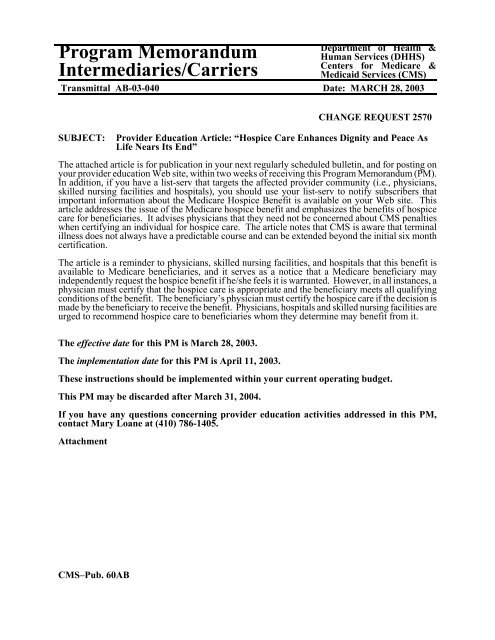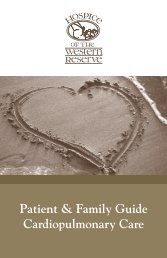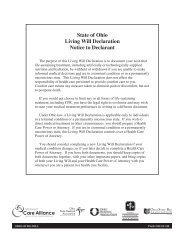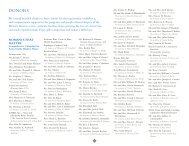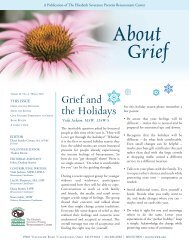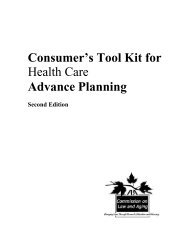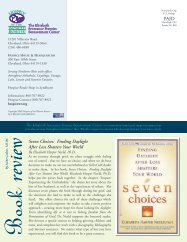Hospice Care Enhances Dignity and Peace As Life Nears Its End
Hospice Care Enhances Dignity and Peace As Life Nears Its End
Hospice Care Enhances Dignity and Peace As Life Nears Its End
You also want an ePaper? Increase the reach of your titles
YUMPU automatically turns print PDFs into web optimized ePapers that Google loves.
Program Memor<strong>and</strong>um<br />
Intermediaries/Carriers<br />
Department of Health &<br />
Human Services (DHHS)<br />
Centers for Medicare &<br />
Medicaid Services (CMS)<br />
Transmittal AB-03-040 Date: MARCH 28, 2003<br />
SUBJECT:<br />
CHANGE REQUEST 2570<br />
Provider Education Article: “<strong>Hospice</strong> <strong>Care</strong> <strong>Enhances</strong> <strong>Dignity</strong> <strong>and</strong> <strong>Peace</strong> <strong>As</strong><br />
<strong>Life</strong> <strong>Nears</strong> <strong>Its</strong> <strong>End</strong>”<br />
The attached article is for publication in your next regularly scheduled bulletin, <strong>and</strong> for posting on<br />
your provider education Web site, within two weeks of receiving this Program Memor<strong>and</strong>um (PM).<br />
In addition, if you have a list-serv that targets the affected provider community (i.e., physicians,<br />
skilled nursing facilities <strong>and</strong> hospitals), you should use your list-serv to notify subscribers that<br />
important information about the Medicare <strong>Hospice</strong> Benefit is available on your Web site. This<br />
article addresses the issue of the Medicare hospice benefit <strong>and</strong> emphasizes the benefits of hospice<br />
care for beneficiaries. It advises physicians that they need not be concerned about CMS penalties<br />
when certifying an individual for hospice care. The article notes that CMS is aware that terminal<br />
illness does not always have a predictable course <strong>and</strong> can be extended beyond the initial six month<br />
certification.<br />
The article is a reminder to physicians, skilled nursing facilities, <strong>and</strong> hospitals that this benefit is<br />
available to Medicare beneficiaries, <strong>and</strong> it serves as a notice that a Medicare beneficiary may<br />
independently request the hospice benefit if he/she feels it is warranted. However, in all instances, a<br />
physician must certify that the hospice care is appropriate <strong>and</strong> the beneficiary meets all qualifying<br />
conditions of the benefit. The beneficiary’s physician must certify the hospice care if the decision is<br />
made by the beneficiary to receive the benefit. Physicians, hospitals <strong>and</strong> skilled nursing facilities are<br />
urged to recommend hospice care to beneficiaries whom they determine may benefit from it.<br />
The effective date for this PM is March 28, 2003.<br />
The implementation date for this PM is April 11, 2003.<br />
These instructions should be implemented within your current operating budget.<br />
This PM may be discarded after March 31, 2004.<br />
If you have any questions concerning provider education activities addressed in this PM,<br />
contact Mary Loane at (410) 786-1405.<br />
Attachment<br />
CMS–Pub. 60AB
Attachment<br />
<strong>Hospice</strong> <strong>Care</strong> <strong>Enhances</strong> <strong>Dignity</strong> <strong>and</strong> <strong>Peace</strong> <strong>As</strong> <strong>Life</strong> <strong>Nears</strong> <strong>Its</strong> <strong>End</strong><br />
Much of the pain <strong>and</strong> sense of hopelessness that may accompany terminal illness can be eased by<br />
services specifically designed to address these needs. <strong>Hospice</strong> care, a fully reimbursable Medicare<br />
Part A benefits option for beneficiaries <strong>and</strong> providers since 1983, offers the services designed to<br />
address the physical <strong>and</strong> emotional pain through effective palliative treatment when cure is not<br />
possible. In the event that a beneficiary has been advised by his/her physician, that a cure for his/her<br />
illness is no longer possible, Medicare beneficiaries may discuss hospice care as an option.<br />
Physicians <strong>and</strong> other health care practitioners can be encouraged that the Medicare program includes<br />
a hospice benefit that provides coverage for a variety of services <strong>and</strong> products designed for those<br />
with terminal diagnoses. When properly certified <strong>and</strong> appropriately managed, hospice care is a<br />
supportive <strong>and</strong> valuable covered treatment option.<br />
Physicians <strong>and</strong> health care providers in the community, skilled nursing facilities, <strong>and</strong> hospitals are<br />
urged to raise awareness among their patients about the hospice benefit <strong>and</strong> its availability. Further,<br />
a beneficiary may independently elect hospice care. The beneficiary may discuss this option in the<br />
event that he or she has a terminal diagnosis; however, in all such cases, a physician must certify that<br />
the beneficiary has a terminal diagnosis with a six month prognosis, if the illness runs its usual<br />
course.<br />
<strong>Hospice</strong> care that is covered by Medicare is chosen for specified amounts of time known as “election<br />
periods.” Essentially, a physician may certify a patient for hospice care coverage for two initial 90-<br />
day election periods, followed by an unlimited number of 60-day election periods. Each election<br />
period requires that the physician certify a terminal illness. Payment is made for each day of the<br />
election period based on one of four per diem rates set by Medicare, commensurate with the level of<br />
care.<br />
Generally speaking, the hospice benefit is intended primarily for use by patients whose prognosis is<br />
terminal, with six months or less of life expectancy. The Medicare program recognizes that terminal<br />
illnesses do not have entirely predictable courses, therefore, the benefit is available for extended<br />
periods of time beyond six months provided that proper certification is made at the start of each<br />
coverage period.<br />
Recognizing that prognoses can be uncertain <strong>and</strong> may change, Medicare’s benefit is not limited in<br />
terms of time. <strong>Hospice</strong> care is available as long as the patient’s prognosis meets the law’s six month<br />
test.<br />
This test is a general one. <strong>As</strong> the governing statute says: “The certification of terminal illness of an<br />
individual who elects hospice shall be based on the physician’s or medical director’s clinical<br />
judgment regarding the normal course of the individual’s illness.”<br />
CMS recognizes that making medical prognostication of life expectancy is not always an exact<br />
science. Thus, physicians need not be concerned. There is no risk to a physician about certifying an<br />
individual for hospice care that he or she believes to be terminally ill.<br />
Many physicians appreciate the fact that hospice care enables family <strong>and</strong> loved ones to participate in<br />
the experience <strong>and</strong> to get help from the hospice in managing their own feelings <strong>and</strong> reactions to the<br />
illness. The value of hospice care is recognized <strong>and</strong> advanced by many physicians <strong>and</strong> other health<br />
professionals. One professional organization, the American Academy of <strong>Hospice</strong> <strong>and</strong> Palliative<br />
Medicine (formerly the Academy of <strong>Hospice</strong> Physicians) focuses its efforts on the “prevention <strong>and</strong><br />
relief of suffering among patients <strong>and</strong> families” through palliative therapy, education <strong>and</strong> counseling.<br />
Among the Academy’s objectives are to “bring the hospice approach into mainstream medicine <strong>and</strong><br />
eliminate the dichotomy whereby patients receive either curative or palliative care.”
This distinction is important because despite a growing appreciation for hospice care both as a<br />
philosophy <strong>and</strong> as a fully covered Medicare benefit, there appears to be two perceived barriers to its<br />
broader acceptance.<br />
First is an underst<strong>and</strong>able reticence to contemplate the end of life. A 1999 survey conducted by the<br />
National <strong>Hospice</strong> <strong>and</strong> Palliative <strong>Care</strong> Organization (NHPCO) found that Americans generally are<br />
reticent to discuss hospice care with their elderly parents. According to the survey, less than one in<br />
four of us have put into writing how we wish to be cared for at life’s end. About one in five have not<br />
contemplated the subject at all, <strong>and</strong> a slightly smaller number told the surveyors they have thought<br />
about it but have not shared their thoughts with others.<br />
The second perceived barrier is a lack of knowledge on the part of both patients <strong>and</strong> practitioners<br />
that the covered hospice benefits are both broad <strong>and</strong> readily available virtually everywhere in the<br />
country. <strong>As</strong> with other covered services, payments for hospice care generally are made to providers<br />
based on prospectively-set rates that are updated every year for inflation. <strong>Hospice</strong> care is primarily a<br />
specialized type of home health care, <strong>and</strong> as is the case with the home health care benefit, hospices<br />
are served by regional intermediaries for Medicare billings, payments, cost reports <strong>and</strong> audits.<br />
<strong>Hospice</strong> care also is covered by Medicaid in many states. Medicare covers a number of specific<br />
services as defined in regulation <strong>and</strong> in the Medicare <strong>Hospice</strong> Program Manual. Most of these<br />
services are familiar to health care professionals <strong>and</strong> other practitioners who have worked with<br />
skilled nursing facilities (SNFs) <strong>and</strong> home health services. Covered services include:<br />
• Medical <strong>and</strong> nursing care<br />
• Medical equipment (such as wheelchairs or walkers)<br />
• Pharmaceutical therapy for pain relief <strong>and</strong> symptom control<br />
• Home health aide <strong>and</strong> homemaker services<br />
• Social work services<br />
• Physical <strong>and</strong> occupational therapy<br />
• Speech therapy<br />
• Diet counseling<br />
• Bereavement <strong>and</strong> other counseling services<br />
• Case management<br />
<strong>Hospice</strong> care also is covered by Medicaid in many states.<br />
In 1999, 474,270 individuals received hospice care at 2,281 certified hospice programs in the United<br />
States. In 2000 there were 2,266 certified hospices. In 2001, approximately 580,000 individuals<br />
received hospice care at 2, 277 (as of August 2001) certified hospice programs. The hospice setting<br />
also is appropriate for patients who suffer from terminal illnesses such as lung disease or end-stage<br />
heart ailments, cancer, Alzheimer’s disease, <strong>and</strong> terminally ill AIDS patients. <strong>Hospice</strong> is not about<br />
death, but rather about the quality of life as it nears its end, for all concerned – the patient, family<br />
<strong>and</strong> friends, <strong>and</strong> the health professional community.<br />
For more information: go online to www.cms.gov/medicare/hospiceps.htm; check the Medicare<br />
Learning Network at www.cms.gov/medlearn/; or see a related informational brochure on hospice<br />
care at: www.medicare.gov/publications.


